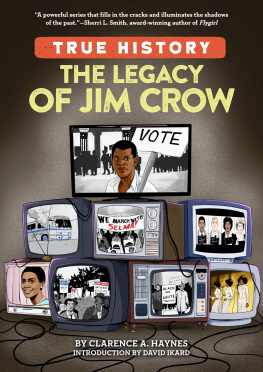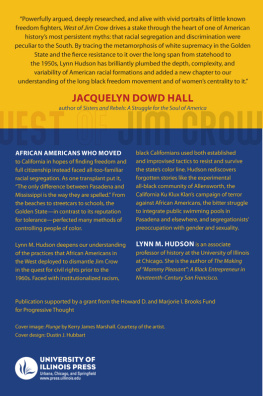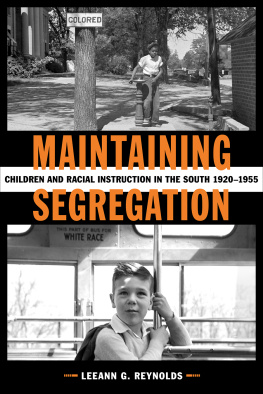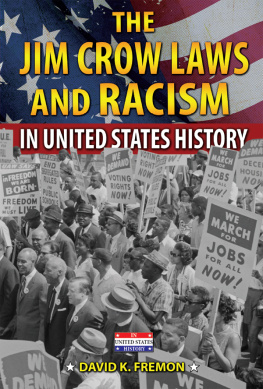William H. Chafe is professor emeritus of history and Alice Mary Baldwin Professor of History emeritus at Duke Universitys Sanford School of Public Policy. He is the author of more than ten books. Raymond Gavins, a professor of history at Duke University and project director of Behind the Veil, is the author of The Perils and Prospects of Southern Black Leadership. Robert Korstad, project director of Behind the Veil, is the Kevin D. Gorter Professor of Public Policy and History at Duke University.




In memory of Joe Wood,
whose vision helped make this book possible
Major funding for the Behind the Veil Project at the Center for Documentary Studies at Duke University was provided by the National Endowment for the Humanities and the Lyndhurst Foundation with additional support from the Rockefeller Foundation, the Devonwood Foundation, and the Graduate Schools at Duke University and the University of North Carolina at Chapel Hill.
2001 by the Center for Documentary Studies for the Behind the Veil Project
All rights reserved.
No part of this book may be reproduced, in any form, without written permission from the publisher.
Requests for permission to reproduce selections from this book should be mailed to:
Permissions Department, The New Press,
120 Wall Street, 31st floor, New York, NY 10005.
First published in the United States by The New Press, New York, 2001
This paperback edition published in the United States by The New Press, New York, 2014
Distributed by Perseus Distribution
ISBN 978-1-62097-043-0 (e-book with audio)
CIP data available
The New Press publishes books that promote and enrich public discussion and understanding of the issues vital to ur democracy and to a more equitable world. These books are made possible by the enthusiasm of our readers; the support of a committed group of donors, large and small; the collaboration of our many partners in the independent media and the not-for-profit sector; booksellers, who often hand-sell New Press books; librarians; and above all by our authors.
www.thenewpress.com
Composition by dix!
2 4 6 8 10 9 7 5 3 1
CONTENTS

)
Within the Veil was he born,)
FROM THE SOULS OF BLACK FOLK BY W.E.B. DU BOIS
O ral history is a collaborative enterprise. From the beginning, the Behind the Veil Project has relied on a national network of community and institutional contacts, academics, undergraduate work-study students, independent scholars, transcribers, elders, and other individuals and groups who share a passion for collecting, preserving, and presenting African American history. Above all, we are profoundly indebted to the scores of African American elders who gave so much of their precious time and energy in the course of being interviewed. African Americans who came of age during the period of legal segregation deserve a much broader audience than they have received. Black elders who survived Jim Crow can teach usif only we will listenvital lessons about equal citizenship, spiritual striving, and community-building.
This book had its origins in conversations among the senior editors in the late 1980s. We were struck by the paucity of sources reflecting the experiences of African Americans during the era of segregation and feared that, as generations passed away, the first-person testimony of that critical period in our nations history would be lost. These conversations coincided with the creation of the Center for Documentary Studies at Duke University, which eventually became the home for the Behind the Veil Project. During our initial planning, Vicki Crawford, John Frey, Jacquelyn Hall, Robin D. G. Kelley, and Julius Scott shared their knowledge of African American history and oral history with us as we began conceptualizing the project. We also benefited from early discussions with colleagues at Jackson State University.
From the very beginning, Iris Tillman Hill, the Centers founding executive director, has been our most steadfast supporter. She has helped plan and coordinate every aspect of the project, including the preparation of this volume. The Behind the Veil Project owes her an enormous debt.
Three other individuals deserve special mention. First, the Behind the Veil Project could never have succeeded without the energy and intelligence of Leslie Brown and Annie Valk. As history graduate students at Duke University, they played many roles on the project between 1990 and 1996, organizing the National Endowment for the Humanities (NEH) Summer Institute and coordinating the curriculum development project. Most important, they served as the research coordinators of Behind the Veil during its fieldwork phase. They conducted site visits, organized conferences, created and nurtured relationships with community contacts, coordinated meetings, facilitated the summer orientations, and performed the administrative work that kept the Behind the Veil Project running between 1990 and 1996. Leslie and Annie ensured that graduate researchers had housing and transportation as well as the historical background necessary to conduct successful interviews. In addition, Leslie and Annie first proposed the idea of a documents-collection book that would highlight Behind the Veil materials. Paul Ortiz joined the project as a graduate student assistant in 1993, and he was part of the interview teams in 1994 and 1995. In 1996, he became the graduate research coordinator and oversaw much of the archival preparation of the oral history materials. He has played a major coordinating role in the preparation of Remembering Jim Crow. His passion for recovering the history of African Americans has been critical for the success of the project and this book.
In undertaking a major oral history research project, our first task was to survey the scholarly literature and to get scholars to help us frame our research questions. With guidance from the staff of the NEH, we convened a national research conference at North Carolina Central University on March 1517, 1991, where Beverly Jones, Freddie Parker, and other members of the history department provided valuable support. Over 75 scholars participated in the conference and heard presentations by Helen G. Edmonds, John Hope Franklin, Leon Litwack, Elsa Barkely Brown, Robin D. G. Kelley, Nan Woodruff, Gavin Wright, Joe William Trotter, Evelyn Brooks Higginbotham, Trudier Harris, and Richard Powell. Vicki Crawford, Mary Ellen Curtin, and CDS staff members Darnell Arnoult and Kira Dirlik made valuable contributions to the conference.
Next page







